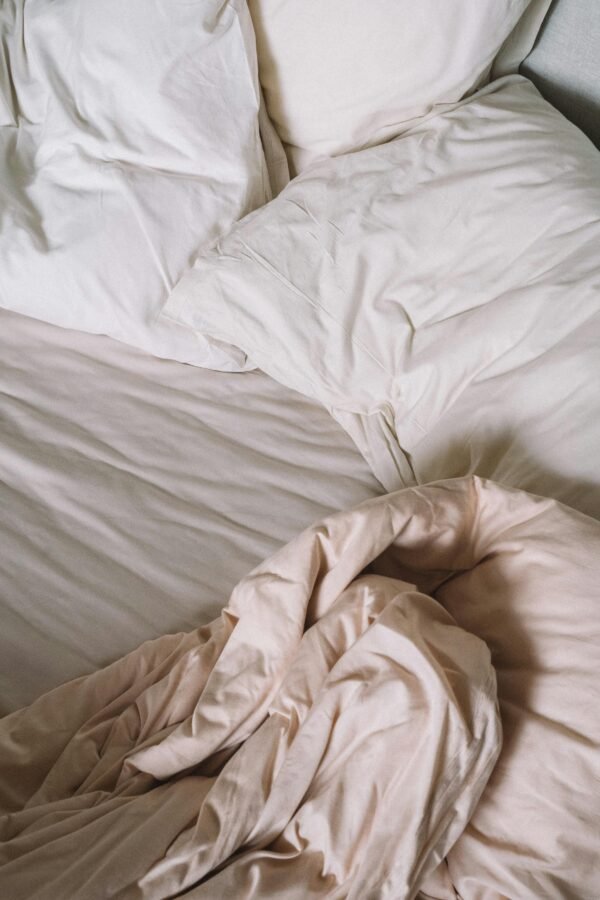
How the Nation Winds Down: Brits’ Bedtime Habits
Do you make your bed every day? How many pillows are too many? From bed-making routines to PJ preferences, here are the secrets behind the UK’s sleep habits and how they impact our wellbeing.

Bedtime rituals reveal more than just how we sleep. Sleep hygiene has become a pillar of wellness over the last couple of years. A new survey from M&S uncovers Brits’ bedtime habits, revealing everything from bed-making routines to pillow preferences. The findings not only highlight how we prepare for rest but also underline how these habits impact sleep quality and overall wellbeing. Creating a comfortable, welcoming bedscape and sleep environment can directly affect your sleep. Considering we spend a large portion of our time in bed, why not make it the ultimate snug oasis?
With expert tips and solutions from Karen Thomas, Head of Homeware Design, and Soozie Jenkinson, Head of Lingerie Design, to help Brits create their ultimate sleep sanctuary, the findings shed light on everything from pillow counts to pyjamas.
Bed-making rituals
Do you make your bed every morning, or do you believe in the ‘leave it messy’ approach? For over half of Brits (60%), making the bed is a daily ritual, with Yorkshire proudly leading the way at 67%.
Making your bed isn’t just about aesthetics. Creating a relaxing bedscape with throws and cushions can help you start your day right. Meanwhile, in the evening, an inviting bed tempts you to climb in. Karen says “Taking a few moments each morning to make your bed can set a positive tone for the day. It creates a welcoming space to return to and promotes a sense of calm and order. Adding a stylish throw or neatly arranged cushions can elevate the look, making your bed look both inviting and put together.”
The great pillow debate
How many pillows and cushions are too many? Half of Brits (50%) prefer a practical three to four pillows, while younger adults (18–24) embrace excess, with 4% admitting to seven or more.
While cushions aid aesthetics and cosiness, it is also important to prioritise a good pillow that support your head and neck.
“The key to better sleep lies in finding the right pillow setup,” Karen tells us. “Your pillow should support your head and neck in alignment with your spine. Different pillow fills – such as feather, down, memory foam, or synthetic – offer varying levels of support and comfort. Natural feather fillings are generally softer and lightweight compared to synthetic options, but some materials can trigger allergies in certain individuals. Whether you prefer minimalism or plush layers, the right choice can transform your sleep quality.”
Sleepwear choices
When it comes to sleepwear, full-length pyjamas are the nation’s favourite, with 32% of Brits choosing this cosy option. From lightweight cotton sets to plush fleece, the right sleepwear can vary by season and personal preference, but comfort is always key to a restful night.
When it comes to pyjama hygiene, the majority of Brits (40%) wash their pyjamas after every 2-3 wears, followed closely by 38% who wait until 4-5 wears.
Comfortable pyjamas play a vital role in achieving quality rest, ranking alongside minimal noise (49%), complete darkness (43%), and room temperature control (36%). Among women, 39% credited comfortable pyjamas as essential to helping them drift off, compared to 25% of men.
“Choosing soft, breathable fabrics is essential for everyone,” says Soozie. “The right pyjamas, like our 100% cotton pjs, help regulate body temperature, keeping you comfortable through the night. Our cotton modal blend fabrics are also enhanced with our Cool Comfort technology for extra comfort.”
The sleep sweet spot
While most Brits (52%) report getting the recommended 7–8 hours of sleep, the survey reveals notable variations across age groups and demographics. On average, respondents sleep for 6 hours and 47 minutes each night, with those aged 35–44 most likely to hit the 7–8-hour sweet spot at 59%. However, not everyone is catching enough zzz’s – 6% of respondents aged 18–24 and 65+ admit to averaging less than 5 hours of sleep.
Interestingly, 18–24-year-olds also reported the highest percentage of long sleepers, with 8% saying they get 9–10 hours of sleep. Gender differences were minimal, with 51% of men and 53% of women meeting the recommended 7–8 hours.
These insights highlight the importance of tailoring bedtime routines to individual needs. “Sleep is vital to our health and wellbeing,” says Soozie. “Even small changes, like establishing a consistent bedtime, choosing the right sleepwear, or creating a calming sleep environment, can make a big difference in helping you achieve better quality rest.”
M&S offers a wide range of products, from premium bedding and luxurious nightwear to home accessories, all designed to help you create the perfect sleep environment.












































